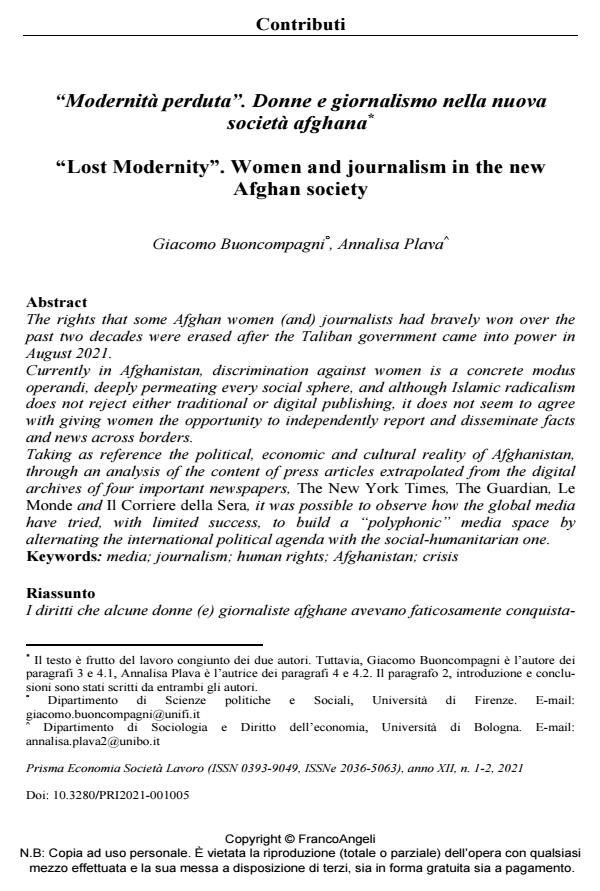"Lost Modernity". Women and journalism in the new Afghan society
Journal title PRISMA Economia - Società - Lavoro
Author/s Giacomo Buoncompagni, Annalisa Plava
Publishing Year 2023 Issue 2021/1-2
Language Italian Pages 18 P. 64-81 File size 387 KB
DOI 10.3280/PRI2021-001005
DOI is like a bar code for intellectual property: to have more infomation
click here
Below, you can see the article first page
If you want to buy this article in PDF format, you can do it, following the instructions to buy download credits

FrancoAngeli is member of Publishers International Linking Association, Inc (PILA), a not-for-profit association which run the CrossRef service enabling links to and from online scholarly content.
The rights that some Afghan women (and) journalists had bravely won over the past two decades were erased after the Taliban government came into power in August 2021. Currently in Afghanistan, discrimination against women is a concrete modus operandi, deeply permeating every social sphere, and although Islamic radicalism does not reject either traditional or digital publishing, it does not seem to agree with giving women the opportunity to independently report and disseminate facts and news across borders. Taking as reference the political, economic and cultural reality of Afghanistan, through an analysis of the content of press articles extrapolated from the digital archives of four important newspapers, The New York Times, The Guardian, Le Monde and Il Corriere della Sera, it was possible to observe how the global media have tried, with limited success, to build a "polyphonic" media space by alternating the international political agenda with the social-humanitarian one.
Keywords: media; journalism; human rights; Afghanistan; crisis
- Abed F. & Gibbons-Neff T. (2021) “Targeted Killings Are Terrorizing Afghans. And No One Is Claiming Them”, The New York Times, 2 gennaio, -- disponibile al link: https://www.nytimes.com/2021/01/02/world/asia/afghanistan-targeted-killings.html.
- Acocella I. & Pepicelli R. (2018) Transnazionalismo, cittadinanza, pensiero islamico. Forme di attivismo dei giovani musulmani in Italia, il Mulino: Bologna.
- AGI (2021) Il Pentagono, l’ultimatum dei talebani e la scadenza del 31 agosto, 23 agosto, -- disponibile al link: https://www.agi.it/estero/news/2021-08-23/pentagono-ultimatum-talebani-scadenza-31-agosto-13649672/.
- Altheide D.L. & Snow R.P. (1979) Media Logic, Sage: London.
- Arnaldo L. (2021) “La fuga dall’Afghanistan e l’impatto sull’immigrazione in Europa”, Il Giorno, 18 agosto, -- disponibile https://www.ilgiorno.it/esteri/afghanistan-immigrazione-europa-talebani-1.6706757.
- Bentivegna S., Boccia Artieri G. (2021) Voci della democrazia. Il futuro del dibattito pubblico, il Mulino: Bologna.
- Buoncompagni G. (2021) “The Role of Technology and “Infodemic” in The New Afghan Crisis”, Security, Terrorism, Society, 14, pp. 67-81.
- Buoncompagni G. (2022) Instability. La società che sopravvive, Ed. La Gru: Sonnino (La).
- Cesare G. (2021) “Torna il ministero contro il Vizio. La “polizia morale” punirà i comportamenti inadeguati”, Il Giornale, 10 settembre, -- disponibile al link: https://www.ilgiornale.it/news/politica/torna-ministero-contro-vizio-polizia-morale-punir-i-1974271.html.
- Committee to Protect Journalists (CPJ) (2021) Taliban take 2 female state TV anchors off-air in Afghanistan, beat at least 2 journalists, -- disponibile al link: https://cpj.org/2021/08/taliban-take-2-female-state-tv-anchors-off-air-in-afghanistan-beat-at-least-2-journalists/.
- Coviello M. (2021) “Talebani: «Rispetteremo le donne, ma secondo la sharia». Ma cosa significa?”, Vanity Fair, 18 agosto, -- disponibile al sito: https://www.vanityfair.it/news/cronache/2021/08/18/talebani-prima-conferenza-stampa-rispetteremo-donne-islam-sharia.
- De Poli B. (2007) I musulmani nel terzo millennio. Laicità e secolarizzazione nel mondo islamico, Carocci: Roma.
- Eickelman D.F. & Salvatore A. (2002) “The Public Sphere And Muslim Identities”, European Journal Of Sociology, 43(1), pp. 92-115.
- Euronews (2021) Afghanistan, dall'arrivo dei talebani ha chiuso il 43% dei media, 24 dicembre, -- disponibile al sito: https://it.euronews.com/2021/12/24/afghanistan-dall-arrivo-dei-talebani-ha-chiuso-il-43-dei-media.
- Garcia C. (2021) Female journalist who made history interviewing Taliban representative flees Afghanistan, -- disponible al sito: https://theweek.com/world/1004281/female-journalist-who-made-history-interviewing-taliban-representative-flees.
- Giaccadi C., Magatti M. (2022) Supersocietà, Bologna: il Mulino.
- Giordana E. (2021) “Denuncia di Reporters sans frontières: «Le giornaliste afghane stanno scomparendo»”, Il Manifesto, 3 settembre, -- disponibile al sito: https://ilmanifesto.it/denuncia-di-reporters-sans-frontieres-le-giornaliste-afghane-stanno-scomparendo/.
- Grimaldi L. (2021) “Salvate in Afghanistan premiate in Italia. Le giornaliste Ghazal Yahya Zadeh e Arezoo Yahya Zadeh, attive per i diritti delle donne e salvate dai militari italiani, saranno premiate il 19 novembre alla Reggia di Caserta”, Indipendent TV, novembre 20, -- disponibile al sito: http://www.indipendenttv.it/2021/11/20/salvate-in-afghanistan-premiate-in-italia-le-giornaliste-ghazal-yahya-zadeh-e-arezoo-yahya-zadeh-attive-per-i-diritti-delle-donne-e-salvate-dai-militari-italiani-saranno-premiate-il-19-novembre-alla/.
- Lanzellotto S. (2019) Donne e conquista dei diritti umani, in Federici M.C., L’arte femminile della mediazione, Armando: Roma.
- McCombs M.E. & Shaw D.L. (1972) “The Agenda-Setting Function of Mass Media”, The Public Opinion Quarterly, 36(2), pp. 176-187, -- disponibile http://www.jstor.org/stable/2747787.
- Minakov M. (2021) Il progresso e il suo contrario, in Rabkin M.Y., Minakov M., a cura di, Demodernizzazione. Un futuro nel passato, Ledizioni: Milano.
- Pendezza L. (2021) “Giornaliste afghane salvate dall’Italia: “I Talebani dividevano con un bastone chi poteva lasciare Kabul e chi no””, Notizie.it, -- disponibile al link: https://www.notizie.it/giornaliste-afghane-salvate-dallitalia-i-talebani-dividevano-con-un-bastone-chi-poteva-lasciare-kabul-e-chi-no/.
- Pepicelli R. (2018) Femminismo islamico. Corano, diritti, riforme, Carocci: Roma.
- Reporters Sans Frontiéres (2021) Afghanistan, -- disponibile al link: https://rsf.org/fr/afghanistan.
- Russ-Mohl S. (2011) Fare giornalismo, il Mulino: Bologna.
- Schudson M. (1988), La scoperta delle notizia, Napoli: Liguori.
- Silverstone R. (2009) Mediapolis. La responsabilità dei media nella civiltà globale, Vita e Pensiero: Milano.
- Sontag S. (2021) Davanti al dolore degli altri. Nottetempo: Milano.
- Sorrentino, C. (2015) “Dove sta andando il giornalismo?”, Sociologia della Comunicazione, pp. 68-78.
- Sorrentino C., Splendore S. (2022) Le vie del giornalismo. Come si raccontano i giornalisti italiani, Bologna: il Mulino.
- Tipaldo G. (2014) L’analisi del contenuto e i mass media. Oggetti, metodi e strumenti, il Mulino: Bologna.
- Tolo News (2021) Nima Woraz: Kabul Situation Discussed, -- disponibile al sito: https://tolonews.com/nima-rooz-174263.
- Wolton D. (2009) Informer n’est pas communiquer, CNRS editions: Paris.
Giacomo Buoncompagni, Annalisa Plava, "Modernità perduta". Donne e giornalismo nella nuova società afghana in "PRISMA Economia - Società - Lavoro" 1-2/2021, pp 64-81, DOI: 10.3280/PRI2021-001005